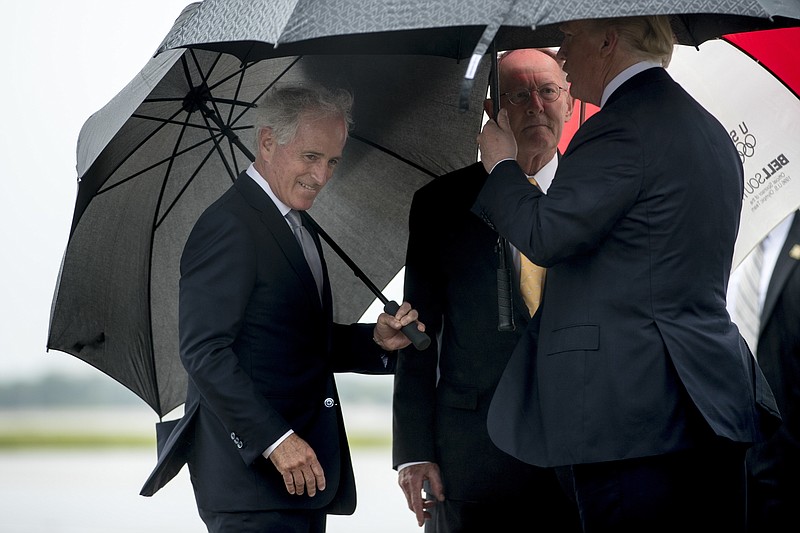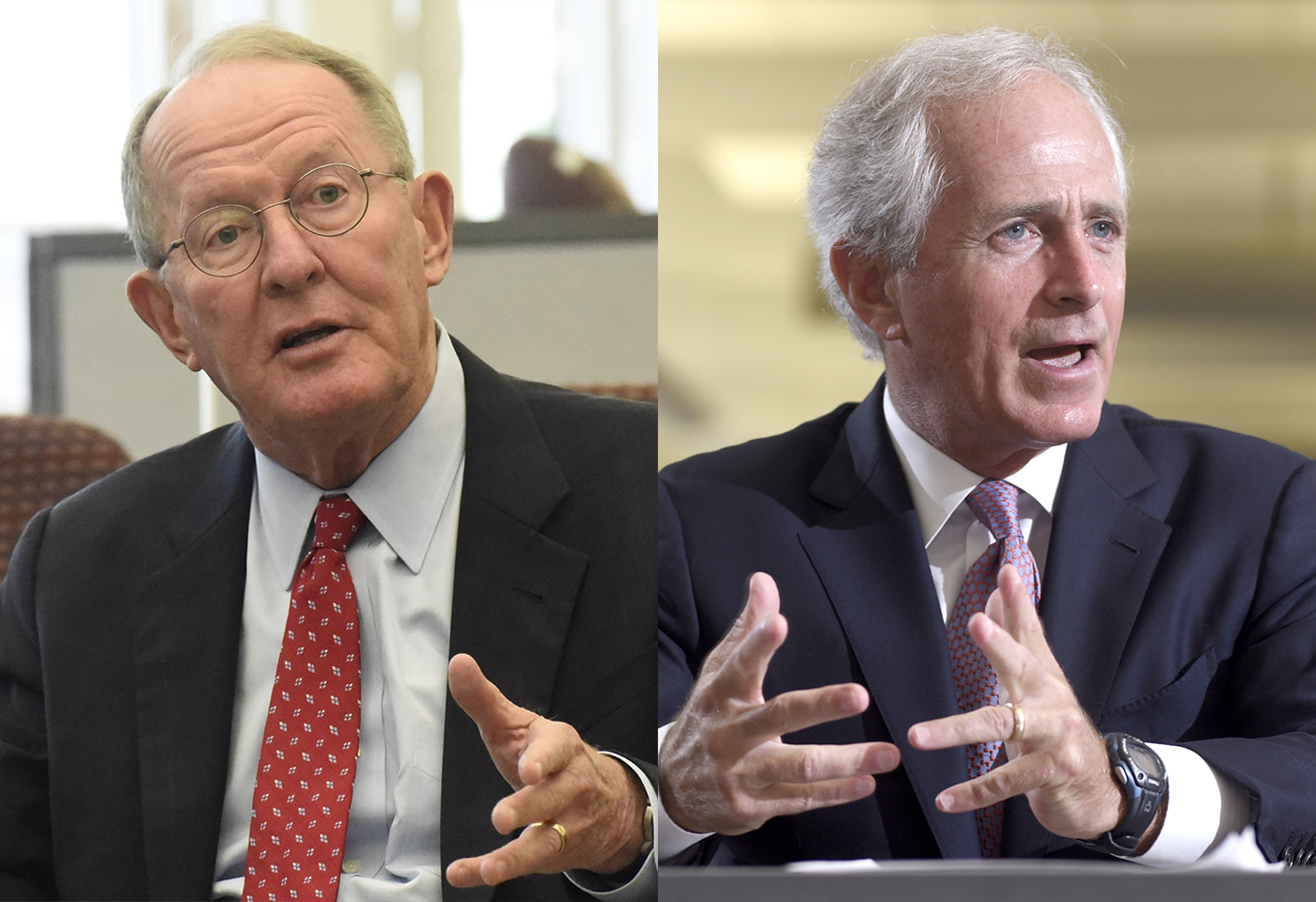NASHVILLE - Despite a personal call from President Donald Trump urging he not do so, U.S. Sen. Bob Corker, R-Tenn., along with a bipartisan coalition of senators, introduced legislation Wednesday to require congressional approval for the president's tariffs on imported steel and aluminum, as well as potential new ones.
"While we all agree on the need to ensure the international trade system is fair for American workers, companies and consumers, unfortunately, the administration is abusing the Section 232 authority delegated to the president by Congress," said Corker, chairman of the Senate Foreign Relations Committee, in a news release.
Among the bill's other sponsors are U.S. Sen. Lamar Alexander, R-Tenn., and Sen. Mark Warner, D-Va., both of whom have voiced concerns over the president's invoking of a national security provision - Section 232 of the Trade Expansion Act of 1962 - to slap Canada, Mexico and the European Union with tariffs on steel and aluminum exports to the U.S.
Prior to introducing the bill, Corker revealed to Washington-based reporters that Trump personally called him and asked that he not proceed with the legislation.
"He's obviously not pleased with this effort," the former Chattanooga mayor said.
Corker described his talk with Trump as "fairly lengthy." As for whether Trump was objecting to the legislation, Corker said "Oh yeah."
"It's a difference of opinion," Corker said. "He feels that this takes away his negotiating ability and this in no way takes away his negotiating ability. It's not any different from his meeting with [North Korea Leader] Kim Jong Un and - if they reach a deal - him bringing it to Congress. I've explained it's exactly the same thing."
Asked whether the conversation was "tense," Corker would only say "we had a heartfelt conversation. Finally, a lot of time had gone by, and I had other meetings."
Close allies are retaliating even as Trump weighs invoking the same national security provision on imported cars, trucks, vans and related parts likely to impact Tennessee-based Volkswagen, Nissan and General Motors plants, as well as suppliers here.
Corker later said "making claims regarding national security to justify what is inherently an economic question not only harms the very people we all want to help and impairs relations with our allies but also could invite our competitors to retaliate."
If the president "truly believes invoking Section 232 is necessary to protect the United States from a genuine threat, he should make the case to Congress and to the American people and do the hard work necessary to secure congressional approval," Corker added.
By day's end, U.S. Sen. Johnny Isakson, R-Ga., had also signed onto the bill, giving it at least 12 Republican and Democratic sponsors.
Trump is looking at applying the same national-security section to new tariffs on imported vehicles and parts, all of which could impact Tennessee-based manufacturers.
It's Corker's most direct confrontation with Trump. And it comes on trade, an issue both men care deeply about from different perspectives.
Trump is playing hardball to renegotiate long-standing agreements with Canada, Mexico and the European Union. But counter-measures by those normally close allies have fanned fears of a ruinous trade war.
Three of the organizations funded by the libertarian billionaire Koch brothers - Americans for Prosperity, Freedom Partners and the LIBRE Initiative - are backing Corker and his Senate allies, sending the senator a letter saying "we strongly support your efforts and encourage all Senators to support this legislation."
Corker, who isn't seeking re-election to the Senate, hopes to attach the bill as an amendment to a must-pass $647 billion bill, the National Defense Authorization Act. But that's viewed as a tough task. And there is even more opposition from some top House majority Republicans.
Alexander called tariffs "the constitutional responsibility of Congress. If the president thinks that tariffs are necessary for national security reasons, our bill requires Congress to approve that decision within 60 days."
He said generally "these kinds of tariffs are a big mistake, and using national security as an excuse is a bigger mistake. There is no state that is likely to be more damaged by tariffs on aluminum and steel than Tennessee, because in many ways we are the nation's No. 1 auto state."
Alexander said he has "urged President Trump instead to focus on reciprocity - do for our country what our country does for you - instead of imposing tariffs, which are basically higher taxes on American consumers."
The bill requires the president to submit to Congress any proposal to adjust imports in the interest of national security under Section 232. For a 60-day period following submission, legislation to approve the proposal will qualify for expedited consideration. That guarantees opportunity for debate and a vote, Corker has said.
The requirement would apply to all Section 232 actions moving forward, as well as those taken within the past two years.
Contact Andy Sher at asher@timesfreepress.com or 615-255-0550. Follow him on Twitter @AndySher1.
WHAT THEY SAID
"While we all agree on the need to ensure the international trade system is fair for American workers, companies and consumers, unfortunately, the administration is abusing the Section 232 authority delegated to the president by Congress."- U.S. Sen. Bob Corker, R-Tenn."These kinds of tariffs are a big mistake, and using national security as an excuse is a bigger mistake. There is no state that is likely to be more damaged by tariffs on aluminum and steel than Tennessee, because in many ways we are the nation's No. 1 auto state."- U.S. Sen. Lamar Alexander, R-Tenn., bill co-sponsor"For North Dakota farmers, ranchers, and manufacturers, exporting is critical, but the administration's wrongheaded trade policies are putting their livelihoods in jeopardy. Our bipartisan bill would make sure Congress has a key oversight role."- U.S. Sen. Heidi Heitkamp, D-N.D., bill co-sponsor"Tariffs are taxes on American consumers. They hurt American workers, families, and employers. Imposing them under the false pretense of 'national security' weakens our economy, our credibility with other nations, and invites retaliation."- U.S. Sen. Pat Toomey, R-Pa., bill co-sponsor"Congress has ceded far too much law making power to the Executive branch including the power to unilaterally raise tariffs. While our trade agreements do need reform, that reform should be accomplished with congressional approval, not through unilateral executive action that could harm the economy."- U.S. Sen. Mike Lee, R-Utah, bill co-sponsor"While I believe that we should hold China accountable for unfair trade practices and I strongly support strong trade enforcement rules that protect American workers, the President should not be relying on an obscure provision of a trade law intended to uphold national security in order to impose tariffs on our allies."- Sen. John Warner, D-Va., bill co-sponsor"In many respects, America has never been as strong as today, in large part thanks to robust tax and regulatory reforms undertaken by Congress and the administration. To sustain the momentum, Koch supports this bipartisan legislation, which helps restore Congress' constitutional authority on matters of trade, including any tariffs proposed on the grounds of national security."- Philip Ellender, president of government and public affairs, Koch Industries"This emerging trade war endangers the remarkable economic progress we've seen in the past year. ... This modest proposal to clarify congressional prerogatives is welcome and long overdue."- Neil Bradley, executive vice president and chief policy officer, U.S. Chamber of Commerce"The Constitution is clear: Congress has the authority to regulate commerce and oversee trade. It's time for Congress to exert its authority and play a leading role in mitigating escalating trade tensions with our strongest allies."- National Retail Federations Senior Vice President for Government Relations David French

